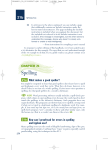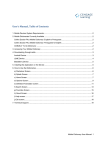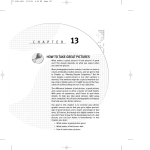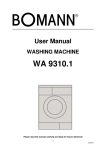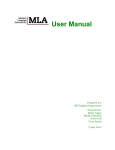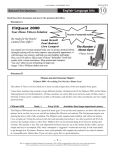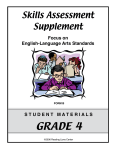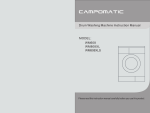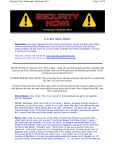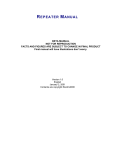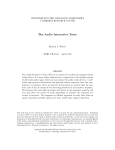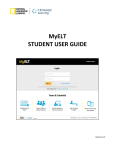Download The Impact of Words
Transcript
TROYMC10_29_0131889567.QXD 20b 1/27/06 6:30 PM Page 246 THE IMPACT OF WORDS The suffix -wise means “in a manner, direction, or position.” Never attach -wise indiscriminately to create new words. Instead, choose words that already exist; when in doubt, consult a dictionary to see if the -wise word you have in mind is acceptable. -wise Written out, the three words start with a capital W. Its abbreviation only in URLs is www. When you use only the word Web, start it with a capital W. World Wide Web would of Would of is nonstandard for would have. Your is a possessive. You’re is the contraction of you are. You’re kind to volunteer your time at the senior center. your, you’re ■ CHAPTER 20 The Impact of Words 20a What is American English? Evolving over centuries into a rich language, American English is the variation of English spoken in the United States. It demonstrates that many cultures have created the US “melting pot” society. Food names, for example, reflect that Africans brought the words okra, gumbo, and goober (peanut); Spanish and Latin American peoples contributed tortilla, taco, burrito, and enchilada. Greek speakers gave us pita, Cantonese speakers chow, and Japanese speakers sushi. 20b What are levels of formality in language? Levels of formality in DICTION and SENTENCE VARIETY can be divided into three levels: highly informal (an e-mail or a letter to a friend); highly formal (the language of ceremony, written and often spoken); and medium or semiformal (ACADEMIC WRITING). INFORMAL MEDIUM OR SEMIFORMAL FORMAL 246 Stars? Wow! They’re, like, made of gas! Gas clouds slowly transformed into stars. The condensations of gas spun their slow gravitational pirouettes, slowly transmogrifying gas cloud into star. —Carl Sagan, “Starfolk: A Fable” TROYMC10_29_0131889567.QXD 1/27/06 6:30 PM Page 247 What is figurative language? 20d 20c What is edited American English? STANDARD ENGLISH, reflects the standards of the written language expected of a textbook. With edited American English, you can achieve the medium or semiformal language level required in ACADEMIC WRITING. Edited American English isn’t a special or fancy dialect for elite groups. Rather, it’s a form of the language used by educated people to standardize communication in the larger world. Edited American English conforms to widely established rules of grammar, sentence structure, punctuation, and spelling—as covered in this handbook. Nonstandard English is legitimately spoken by some groups in our society. With its own grammar and usage customs, it communicates clearly to other speakers of nonstandard English. Yet, one thing is certain: Speakers of nonstandard English often benefit when they can switch, either temporarily or permanently, to the medium or semiformal level of language (20b) required in academic writing. Also, advertising language and other writing intended for a large, diverse audience might ignore the conventions of edited American English. Such published, nonstandard departures from edited American English are not appropriate in academic writing. Edited American English, also known as 20d What is figurative language? Figurative language uses words for more than their literal meanings. Such words aren’t merely decorative or pretentious (20h). Figurative language greatly enhances meaning. It makes comparisons and connections that draw on one idea or image to explain another. Box 20-1 explains the different types of figurative language and describes one type you should avoid, the mixed metaphor. B OX 2 0 - 1 S U M M A RY Types of figurative language ■ Analogy: Comparing similar traits shared by dissimilar things or ideas. Its length can vary from one sentence (which often takes the form of a simile or metaphor) to a paragraph. A cheetah sprinting across the dry plains after its prey, the base runner dashed for home plate, cleats kicking up dust. ■ Irony: Using words to suggest the opposite of their usual sense. Told that a minor repair on her home would cost $2,000 and take two weeks, she said, “Oh, how nice!” ➞ 247 TROYMC10_29_0131889567.QXD 20e 1/27/06 6:30 PM Page 248 THE IMPACT OF WORDS Types of figurative language (continued) ■ Metaphor: Comparing otherwise dissimilar things. A metaphor doesn’t use the word like or as to make a comparison. Rush-hour traffic in the city bled out through major arteries to the suburbs. ■ Personification: Assigning a human trait to something not human. (See below about not using mixed metaphors.) The book begged to be read. ■ Overstatement (also called hyperbole): Exaggerating deliberately for emphasis. If this paper is late, the professor will kill me. ■ Simile: Comparing dissimilar things. A simile uses the word like or as. Langston Hughes observes that a deferred dream dries up “like a raisin in the sun.” ■ Understatement: Emphasizing by using deliberate restraint. It feels warm when the temperature reaches 105 degrees. ■ Mixed metaphor: Combining two or more inconsistent images in one sentence or expression. Never use a mixed metaphor. NO The violence of the hurricane reminded me of a train ride. [A train ride is not violent, stormy, or destructive.] YES The violence of the hurricane reminded me of a train’s crashing into a huge tractor trailer. EXERCISE 20-1 Working individually or with a group, identify each figure of speech. Also, revise any mixed metaphors. For help, consult 20d. 1. In the year 2000, we stood with one foot in the twentieth century while we set sail on the sea of a new era in the twenty-first. 2. If I eat one more bite of that chocolate cake, I’ll explode. 3. The daisies nodded their heads in the hot sun. 4. Beginning to testify in the courtroom, the defendant was as nervous as a long-tailed cat in a roomful of rocking chairs. 5. The actor displayed the entire range of human emotions from A to B. 20e How can using exact diction enhance my writing? Diction, the term for choice of words, affects the clarity and impact of any writing you do. Your best chance of delivering your intended message to your readers is to choose words that fit exactly with each piece of writing. 248 TROYMC10_29_0131889567.QXD 1/27/06 6:30 PM Page 249 How can using exact diction enhance my writing? 20e To choose words correctly—that is, to have good diction—you need to understand the concepts of denotation and connotation in words. 20e.1 What is denotation in words? The denotation of a word is its exact, literal meaning. It’s the meaning you find when you look up the word in a dictionary. Readers expect you to use words according to their established meanings for their established functions. Using dictionaries A dictionary is your ultimate authority for a word’s denotation—that is, its definition. The reference section in most college libraries includes one or more kinds of dictionaries for general use and for specialized areas. E S L N O T E : The Dictionary of American English (Boston: Heinle & Heinle, distributed by Berlitz, 2000) is particularly useful for students who speak English as a second (or third) language. 20e.2 What is connotation in words? Connotation refers to ideas implied by a word. Connotations are never com- pletely fixed, for they can vary in differing contexts. Connotations involve associations and emotional overtones that go beyond a word’s definition. For example, home usually evokes more emotion than its denotation “a dwelling place” or its synonym house. Home carries the connotation, for some, of the pleasures of warmth, security, and love of family. For others, however, home may carry unpleasant connotations, such as abusive experiences or the impersonal atmosphere of an institution to house the elderly. Using a thesaurus Sometimes a good college dictionary explains the small differences among synonyms, but a thesaurus is devoted entirely to providing synonyms for words. In distinguishing among synonyms—the other words close in meaning to a word—a thesaurus demonstrates connotation in operation. As you use a thesaurus, remain very alert to the subtle shades of meaning that create distinctions among words. For instance, using notorious to describe a person famous for praiseworthy achievements in public life is wrong. Although notorious means “well-known” and “publicly discussed”—which is true of famous people—the connotation of the word is “unfavorably known or talked about.” George Washington is famous, not notorious. Al Capone, by contrast, is notorious. A L E R T: Most word processing programs include a thesaurus. But be cautious in using it. Unless you know the exact meaning of an offered synonym, as well as its part of speech, you may choose a wrong word or introduce a grammatical error into your writing. For example, one word processing 249 TROYMC10_29_0131889567.QXD 20f 1/27/06 6:30 PM Page 250 THE IMPACT OF WORDS program’s thesaurus offers these synonyms for deep in the sense of “low (down, inside)”: low, below, beneath, and subterranean. None of these words could replace deep in a sentence such as The crater is too deep [not too low, too below, too beneath, or too subterranean] to be filled with sand or rocks. EXERCISE 20-2 Working individually or with a group, look at each list of words, and divide the words among three headings: “Positive” (good connotations); “Negative” (bad connotations); and “Neutral” (no connotations). If you think that a word belongs under more than one heading, you can assign it more than once, but be ready to explain your thinking. For help, consult a good dictionary and 20e.2. EXAMPLE grand, big, bulky, significant, oversized Positive: grand, significant; Negative: bulky, oversized; Neutral: big 1. harmony, sound, racket, shriek, melody, music, noise, pitch, voice 2. talkative, articulate, chattering, eloquent, vocal, verbose, gossipy, fluent, gabby 3. decorative, beautiful, modern, ornate, overelaborate, dazzling, flashy, elegant, sparkling 4. long, lingering, enduring, continued, drawn-out, stretched, never-ending, unbreakable, incessant 5. calculating, shrewd, crafty, ingenious, keen, sensible, sly, smooth, underhanded 20f How can using specific words enhance my writing? Specific words identify individual items in a group (Buick, Honda). General words relate to an overall group (car). Concrete words identify what can be per- ceived by the senses, by being seen, heard, tasted, felt, smelled (black padded leather dashboard), and convey specific images and details. Abstract words denote qualities (kindness), concepts (speed), relationships (friends), acts (cooking), conditions (bad weather), and ideas (transportation) and are more general. Usually, specific and concrete words bring life to general and abstract words. Therefore, whenever you use general and abstract words, try to supply enough specific, concrete details and examples to illustrate them. Here are sentences with general words that come to life when revised with specific words. GENERAL SPECIFIC 250 His car gets good gas mileage. His Slurpo gets about 35 mpg on the highway and 30 mpg in the city. TROYMC10_29_0131889567.QXD 1/27/06 6:30 PM Page 251 What is gender-neutral language? GENERAL SPECIFIC 20g Her car is comfortable and easy to drive. When she drives her new Cushia on a five-hour trip, she arrives refreshed and does not need a long nap to recover, as she did when she drove her ten-year-old Upushme. What separates most good writing from bad is the writer’s ability to move back and forth between the general and abstract and the specific and concrete. Consider these sentences that effectively use a combination of general and specific words to compare cars: GENERAL CONCRETE SPECIFIC ABSTRACT My car, a midnight-black Corvette LS1 convertible, has a powerful SPECIFIC GENERAL SPECIFIC GENERAL 5.7 liter, V8 engine with ride controls, the Tour for regular driving and SPECIFIC CONCRETE GENERAL the Sport for a close-to-the-road feel. In contrast, Harvey’s automobile, CONCRETE SPECIFIC ABSTRACT a bright red Dodge Viper SRT-10 convertible, has a mighty SPECIFIC 8.3 liter, V10 engine with 6-speed manual transmission. EXERCISE 20-3 Revise this paragraph by providing specific and concrete words and phrases to explain and enliven the ideas presented here in general and abstract language. You may revise the sentences to accommodate your changes in language. For help, consult 20f. I hope to get a job as an administrative assistant in the company. At the interview, the person who would be my supervisor was pleasant. We seemed to get along well. The other assistants in the division appeared to be nice. My college courses clearly have prepared me for the position. I think the job would teach me a great deal more. The salary is a bit less than I had hoped for, but the Human Resources representative promised me raises at regular intervals if my work is good. Also, my trip to work would not take too much time for me. If my interviewer calls to offer me the job, I will accept it. 20g What is gender-neutral language? Gender-neutral language, also referred to as gender-free or nonsexist lan- guage, relies on terms that don’t communicate whether the person is male or female (for example, in replacing policeman with police officer or doctors’ wives with doctors’ spouses). Sexist language assigns roles or characteristics to people based on their sex and gender. Most women and men today feel that sexist language unfairly discriminates against both sexes. It inaccurately assumes that every nurse and homemaker is female (and therefore referred to as “she”), and that every physician and stockbroker is male (and therefore referred to as “he”). One 251 TROYMC10_29_0131889567.QXD 20g 1/27/06 7:41 PM Page 252 THE IMPACT OF WORDS common instance of sexist language occurs when the pronoun he is used to refer to someone whose sex is unknown or irrelevant. Although tradition holds that he is correct in such situations, many men and women find it offensive. They feel that using only masculine pronouns to represent all humans excludes women and thereby distorts reality. Gender-neutral language rejects demeaning STEREOTYPES or outdated assumptions, such as “women are bad drivers” and “men can’t cook.” In your writing, never describe women’s looks, clothes, or age unless you do the same for men, or doing so is important. Never use a title for one spouse and the first name for the other spouse: Phil Miller (not Mr. Miller) and his wife, Jeannette, travel on separate planes; or Jeannette and Phil Miller live in Idaho. Box 20-2 gives you guidelines for using gender-neutral language. B OX 2 0 - 2 S U M M A RY How to avoid sexist language ■ Avoid using only the masculine pronoun to refer to males and females together. The he or she and his or hers constructions act as SINGULAR PRONOUNS, and they therefore call for SINGULAR VERBS. Try to avoid using he or she constructions, especially more than once in a sentence or in consecutive sentences. A better solution is revising to the plural. You can also revise to omit the gender-specific pronoun. NO YES NO YES NO YES ■ NO NO YES 252 A successful stockbroker knows he has to work long hours. Successful stockbrokers know they have to work long hours. Everyone hopes that he or she will win the scholarship. Everyone hopes to win the scholarship. Avoid using man when referring to both men and women. YES ■ A doctor has little time to read outside his specialty. A doctor has little time to read outside his or her specialty. Man is a social animal. People are social animals. The history of mankind is predominately violent. Human history is predominately violent. Avoid stereotyping jobs and roles by gender when referring to both men and women. NO YES chairman policeman businessman chair, chairperson police officer businessperson, business executive ➞ TROYMC10_29_0131889567.QXD 1/27/06 6:30 PM Page 253 What other types of language do I want to avoid? 20h How to avoid sexist language (continued) statesman teacher . . . she principal . . . he ■ Avoid expressions that seem to exclude one sex. NO ■ statesperson, diplomat teachers . . . they principals . . . they YES mankind the common man humanity the average person man-sized sandwich huge sandwich old wives’ tale superstition Avoid using demeaning and patronizing labels. NO YES male nurse gal Friday coed My girl can help. nurse assistant student My secretary can help (or better still, Ida Morea can help). E X E R C I S E 2 0 - 4 Working individually or with a group, revise these sentences by changing sexist language to gender-neutral language. For help, consult 20g. 1. Many of man’s most important inventions are found not in scientific laboratories but in the home. 2. Before such appliances became available, a family was fortunate if the husband could afford to hire a cleaning lady or a maid to help with the housework. 3. Once family members were freed from these difficult duties early in the twentieth century, women had more time to spend with their children. 4. Also, now everyone in the household had more time for his favorite pastimes and hobbies. 5. Even more important, with less housework to do, women could now leave the home to take jobs as office girls and sometimes even lady doctors and lawyers. 20h What other types of language do I want to avoid? Language that distorts or tries to manipulate a reader needs to be avoided in ACADEMIC WRITING. These and other types of language to avoid in an academic LEVEL OF FORMALITY are listed, with examples, in Box 20-3. 253 TROYMC10_29_0131889567.QXD 20h 1/27/06 6:30 PM Page 254 THE IMPACT OF WORDS B OX 2 0 - 3 S U M M A RY Language to avoid in academic writing ■ Never use slanted language, also called loaded language; readers feel manipulated by the overly emotional TONE and DICTION. NO YES ■ Never use pretentious language; readers realize you’re showing off. NO YES ■ Our senator is a deceitful, crooked thug. Our senator lies to the public and demands bribes. As I alighted from my vehicle, my clothing became besmirched with filth. My coat got muddy as I got out of my car. Never use sarcastic language; readers realize you’re being nasty. NO He was a regular Albert Einstein with my questions. [This is sarcastic if you mean the opposite.] YES ■ Never use colloquial language; readers sense you’re being overly casual and conversational. NO YES ■ Christina flunked chemistry. Christina failed chemistry. Never use euphemisms, also called doublespeak; readers realize you’re hiding the truth (more in 20k). NO YES NO YES 254 He had trouble understanding many of my questions. Our company will downsize to meet efficiency standards. Our company has to cut jobs to maintain our profits. We consider our hostages as foreign guests being guarded by hosts. We consider our hostages as enemies to be guarded closely. ■ Never use NONSTANDARD ENGLISH (more in 20c). ■ Never use MIXED METAPHORS (more in 20d). ■ Never use SEXIST LANGUAGE or STEREOTYPES (more in 20g and 5g). ■ Never use regional language or dialect. ■ Never use CLICHÉS (more in 20j). ■ Never use unnecessary JARGON (more in 20j). ■ Never use BUREAUCRATIC LANGUAGE (more in 20l). TROYMC10_29_0131889567.QXD 1/27/06 6:30 PM Page 255 What is bureaucratic language? 20i 20l What are clichés? A cliché is a worn-out expression that has lost its capacity to communicate effectively because of overuse. Many clichés are SIMILES or METAPHORS, once clever but now flat. For example, these are clichés: dead as a doornail, gentle as a lamb, and straight as an arrow. If you’ve heard certain expressions repeatedly, so has your reader. Instead of a cliché, use descriptive language that isn’t worn out. If you can’t think of a way to rephrase a cliché, drop the words entirely. 20j When is jargon unnecessary? Jargon is the specialized vocabulary of a particular group. Jargon uses words that people outside that group might not understand. Specialized language exists in every field: professions, academic disciplines, business, various industries, government departments, hobbies, and so on. Reserve jargon for a specialist AUDIENCE. As you write, keep your audience in mind as you decide whether a word is jargon in the context of your material. For example, a football fan easily understands a sportswriter’s use of words such as punt and safety, but they are jargon words to people unfamiliar with American-style football. Avoid using jargon unnecessarily. When you must use jargon for a nonspecialist audience, be sure to explain any special meanings. 20k What are euphemisms? Euphemisms attempt to avoid the harsh reality of truth by using more pleasant, “tactful” words. Good manners dictate that euphemisms sometimes be used in social situations: For example, in US culture, passed away is, in some situations, thought to be gentler than died. Such uses of euphemisms are acceptable. In other situations, however, euphemisms drain meaning from truthful writing. Unnecessary euphemisms might describe socially unacceptable behavior (for example, Johnny has a wonderfully vivid imagination instead of Johnny lies). They also might try to hide unpleasant facts (for example, She is between assignments instead of She’s lost her job). Avoid unnecessary euphemisms. 20l What is bureaucratic language? Bureaucratic language uses words that are stuffy and overblown. Bureau- cratic language (or bureaucratese, a word created to describe the style) is marked by unnecessary complexity. This kind of language can take on a formality that complicates the message and makes readers feel left out. 255 TROYMC10_29_0131889567.QXD 21b 1/27/06 7:41 PM Page 256 SPELLING NO In reference to the above captioned, you can include a page that additionally contains an Include instruction under the herein stated circumstances. The page including the Include instruction is included when you paginate the document, but the included text referred to in its Include instruction is not included. [This message is meaningless, but the writer seems to understand the message. Anyone who doesn’t is clearly uninformed or unable to read intelligently.] —From instructions for compiling a user’s manual In response to earlier editions of this handbook, we’ve been asked to give a YES alternative for this example. We regret that we can’t understand enough of the NO example to do that. If you, gentle reader, can, please contact us at <[email protected]>. CHAPTER 21 Spelling 21a What makes a good speller? You might be surprised to hear that good spellers don’t know how to spell and hyphenate every word they write. What they do know, however, is to check if they’re not sure of a word’s spelling. If your inner voice questions a spelling, do what good spellers do—consult a dictionary. A L E R T: Word processing software usually includes a spell-check program, which claims to spot spelling errors because the words typed in don’t match the spellings in the software’s dictionary. Such programs have one major drawback. The programs can’t detect that you’ve spelled a wrong word if what you’ve typed is a legitimate spelling of a legitimate word. For example, if you mean top but type too, or if you mean from and type form, no spell-check program “sees” a mistake. In these and other similar cases, only the human eye (that is, a reader) can discover the errors. 21b How can I proofread for errors in spelling and hyphen use? Many spelling errors are the result of illegible handwriting, slips of the pen, or typographical mistakes. Catching these “typos” requires especially careful proofreading, using the techniques in Box 21-1. 256











